Chris Ward's Blog, page 9
April 13, 2013
Miffy's Birthday!
Okay, nothing at all about writing on today's blog. This post will be a shameless celebration of my cat, Miffy, who was born four years ago this April.
We're not actually sure of her exact birthday because she was born to a stray cat and abandoned. She was found behind a temple by some monks who offered her to my girlfriend (now wife) who was working there at the time.
We took her home, not expecting her to live because she could barely walk and weighed just 200g, but she did, and now she pretty much controls our lives.
Here's the first video I took of Miffy, two days after we brought her home.
She was already very cute. Within a couple of weeks she was a real handful, as you can see below.
Within a year she was fully grown, as you can see in the next video. I'm sure you'll agree that she's very cute.
Of course, being a responsible cat owner, my favorite past time is taking pictures of my cat. Here's a few of my favorites.
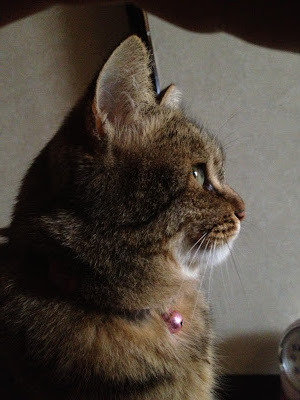







Like most cats, Miffy spends the majority of her time asleep, except when I'm trying to sleep between 3am and 6am. And she had such an influence on our lives that we actually ended up getting married in the same temple behind which she was found, so here's a little wedding photo for you (it'll probably be up for a limited time only, because if the wife knows I've posted it she'll probably make me take it down! ;-) ). I'm the one the skirt and the wife is the one in the dress. That's not the temple btw.

So ...
HAPPY 4TH BIRTHDAY MIFFY!
Now stop wasting time reading about my cat and go buy my books ...! ;-)
Chris Ward
April 13th 2013
We're not actually sure of her exact birthday because she was born to a stray cat and abandoned. She was found behind a temple by some monks who offered her to my girlfriend (now wife) who was working there at the time.
We took her home, not expecting her to live because she could barely walk and weighed just 200g, but she did, and now she pretty much controls our lives.
Here's the first video I took of Miffy, two days after we brought her home.
She was already very cute. Within a couple of weeks she was a real handful, as you can see below.
Within a year she was fully grown, as you can see in the next video. I'm sure you'll agree that she's very cute.
Of course, being a responsible cat owner, my favorite past time is taking pictures of my cat. Here's a few of my favorites.








Like most cats, Miffy spends the majority of her time asleep, except when I'm trying to sleep between 3am and 6am. And she had such an influence on our lives that we actually ended up getting married in the same temple behind which she was found, so here's a little wedding photo for you (it'll probably be up for a limited time only, because if the wife knows I've posted it she'll probably make me take it down! ;-) ). I'm the one the skirt and the wife is the one in the dress. That's not the temple btw.

So ...
HAPPY 4TH BIRTHDAY MIFFY!
Now stop wasting time reading about my cat and go buy my books ...! ;-)
Chris Ward
April 13th 2013
Published on April 13, 2013 05:05
April 12, 2013
Head of Words is now available!
As of this morning, Head of Words went live on Amazons all across the world. Very proud to see this book finally out in the world. It's a lot different to my other releases so far so I'm interested to see what the critical reception will be, however I think its a good book and adds a further round to building literary canon, so to speak ...
The ebook is available now. Hopefully the paperback will follow in the next week or two.

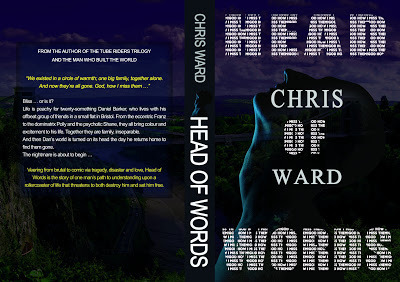
I'm already hitting up the promotion trail for Head of Words. You can read about me being interviewed here on the blog of my friend Robert Thomas, while I also recently did a guest post on the inspiration behind Head of Words for the blog Two Girls Reading here. If anyone would like a copy for review purposes either for your blog or Amazon, please contact me via PM on Facebook or post a comment below.
Next up will be the edits/revisions on Tube Riders: Exile. I'm still shooting for a summer release. More details to come as I get to them. I'm also writing a new horror novel in my "spare" time, so keep up to date with my progress by checking out my wordcount bar on the right. I'm setting it at 120k because I think that's a good length for a book, but it could go up or down. We'll see.
Right, back to the grindstone. A writer's work is never done ....
The ebook is available now. Hopefully the paperback will follow in the next week or two.


I'm already hitting up the promotion trail for Head of Words. You can read about me being interviewed here on the blog of my friend Robert Thomas, while I also recently did a guest post on the inspiration behind Head of Words for the blog Two Girls Reading here. If anyone would like a copy for review purposes either for your blog or Amazon, please contact me via PM on Facebook or post a comment below.
Next up will be the edits/revisions on Tube Riders: Exile. I'm still shooting for a summer release. More details to come as I get to them. I'm also writing a new horror novel in my "spare" time, so keep up to date with my progress by checking out my wordcount bar on the right. I'm setting it at 120k because I think that's a good length for a book, but it could go up or down. We'll see.
Right, back to the grindstone. A writer's work is never done ....
Published on April 12, 2013 01:05
April 7, 2013
Tube Riders is on sale through April for $0.99c
Tube Riders will be on sale for the first half of April (and longer, depending on sales) as part of the build up to the release of the second part of the saga, Tube Riders: Exile, in the summer. The book is finished and is currently in revision.
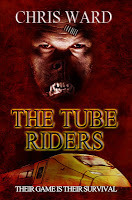
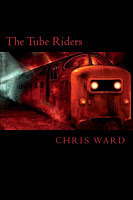
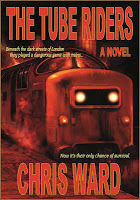 The three covers - the new one, the old paperback and the old ebook
The three covers - the new one, the old paperback and the old ebook
As I've blogged about before, Tube Riders is no longer part of Amazon's Select program and therefore will not be offered for free at any time in the near future. Still, $0.99c is within most budgets and that works out at roughly six pages/cent so you're getting a good deal. Plus, its awesome. If I could, I'd lower it even more to like $0.50c, because this is all about getting readers not getting rich, but the lowest Amazon will let me is $0.99 so you'll have to handle it. Remember, if you don't have a Kindle its available for the same price on all over platforms now. The quickest way is to get it from Smashwords, but you can also get it from any major online retailer like Barnes & Noble or Kobo.
If you're new to the series and have seen the split parts London, Bristol and Cornwall on Amazon, while I'm quite happy if you buy them for a combined total of $6.97 (I'll get lunch on you!) remember you can get the whole thing now for less than a dollar. If you've bought these mistakenly thinking that Bristol and Cornwall are parts two and three of the series, then apologies for that. Remember you can refund your purchases from Amazon within a week. For this very same reason if you want to read any of my short stories I really won't resent you if you buy them, read them and then refund them, as long as you promise to tell people how great they are and that buying The Tube Riders, The Man Who Built the World or any of my forthcoming longer works is a great idea. Most of them are 2,000 - 6,000 words so you should be able to get through them in a single sitting. The reason I have Tube Riders on Amazon in three split parts is purely for visibility and marketing, it's not an attempt at a money grab, although at 65k, 68k, and 38k, the three individual parts are longer than many so-called series books anyway, so if you want to tackle them one at a time I really won't mind.
Anyway, that's it for now. By the way, check out my new progress meters on the side of the blog, just below the new releases mailing list (which you really should sigh up for!). These are partly as motivation for me and partly so you can see how I'm getting on. While I sucked at maths at school I'm a bit of a stats man (hence my love of cricket) so I'll probably update them every couple of days or so. I only have one up at the moment but look out for more!
Okay, back to it...
Chris Ward
8th April 2013


 The three covers - the new one, the old paperback and the old ebook
The three covers - the new one, the old paperback and the old ebook As I've blogged about before, Tube Riders is no longer part of Amazon's Select program and therefore will not be offered for free at any time in the near future. Still, $0.99c is within most budgets and that works out at roughly six pages/cent so you're getting a good deal. Plus, its awesome. If I could, I'd lower it even more to like $0.50c, because this is all about getting readers not getting rich, but the lowest Amazon will let me is $0.99 so you'll have to handle it. Remember, if you don't have a Kindle its available for the same price on all over platforms now. The quickest way is to get it from Smashwords, but you can also get it from any major online retailer like Barnes & Noble or Kobo.
If you're new to the series and have seen the split parts London, Bristol and Cornwall on Amazon, while I'm quite happy if you buy them for a combined total of $6.97 (I'll get lunch on you!) remember you can get the whole thing now for less than a dollar. If you've bought these mistakenly thinking that Bristol and Cornwall are parts two and three of the series, then apologies for that. Remember you can refund your purchases from Amazon within a week. For this very same reason if you want to read any of my short stories I really won't resent you if you buy them, read them and then refund them, as long as you promise to tell people how great they are and that buying The Tube Riders, The Man Who Built the World or any of my forthcoming longer works is a great idea. Most of them are 2,000 - 6,000 words so you should be able to get through them in a single sitting. The reason I have Tube Riders on Amazon in three split parts is purely for visibility and marketing, it's not an attempt at a money grab, although at 65k, 68k, and 38k, the three individual parts are longer than many so-called series books anyway, so if you want to tackle them one at a time I really won't mind.
Anyway, that's it for now. By the way, check out my new progress meters on the side of the blog, just below the new releases mailing list (which you really should sigh up for!). These are partly as motivation for me and partly so you can see how I'm getting on. While I sucked at maths at school I'm a bit of a stats man (hence my love of cricket) so I'll probably update them every couple of days or so. I only have one up at the moment but look out for more!
Okay, back to it...
Chris Ward
8th April 2013
Published on April 07, 2013 23:42
April 5, 2013
Submitting to Magazines - Why and How to do it
During my self-publishing adventures I’ve come across a lot of people who are trying to get a slice of the ebook pie through publishing only novellas and short stories. While these can be just as difficult to write, the shorter form is often seen as being less of a time investment than full novels, simultaneously giving the author more visibility. They are also popular with people who don’t have the time to write regularly or for long periods, or who don’t enjoy spending two years on each novel.
A lot of people I’ve come across are publishing short stories and novellas on Amazon at a furious pace, but is it the only option? For every Wool (which was originally a novella) there are thousands, if not hundreds of thousands, of short pieces selling a handful of copies a month or less.
Disillusioned? Maybe, but unlike novels, which are notoriously hard to sell, short fiction can be a lot easier to market, and although you might not become a superstar, there are still gains to be made.
Prior to self-publishing, I spent fourteen years submitting and occasionally selling stories to magazines. Just to prove it, here are a few of my publications –
The Substitute in Prenumbra Sports and Games EditionMs Ito’s Bird in Weird Tales 352Ovid’s Legacy in Flagship (the pic on the front is from my story!)Going Underground in Noctober Feeding the Gulls in Written Word (pretty salty about this one because I never got paid, but it was like $15, so whatever)
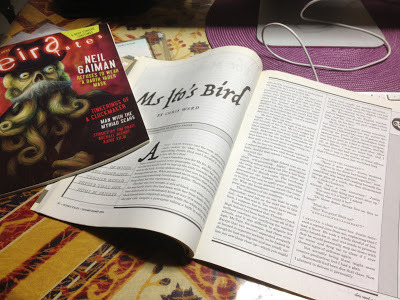 My claim to fame!
My claim to fame!Self-publishing a short story can occasionally be profitable, but more often than not it’ll sit there in cyberspace doing nothing. Also, you can never be quite sure whether it’ll take off or not. So much depends on the title and cover. For example, after my rights returned to me from Weird Tales (after a year, I think, although magazines will buy various rights from 6 months to 2 years), I published Ms Ito’s Bird on Amazon as an individual short story. In roughly ten months it’s sold … wait for it … ONE copy.
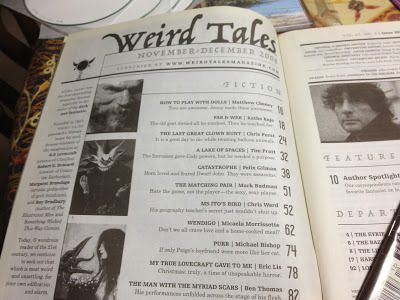 There it is about halfway down ... see it? And the third picture downis from my story! :-)
There it is about halfway down ... see it? And the third picture downis from my story! :-)When I sold it to Weird Tales I made roughly $160. At the time that was more than half of my entire revenue from eight years of trying to sell short stories. And that was just the money - nothing else I have ever achieved in writing EVER has given me the confidence in my work that that sale did. Conan the Barbarian was serialized in that magazine. Getting in Weird Tales is big time.
Getting back to the cold hard cash line, there’s money to be made from selling short stories if you’re good, but here’s a few common pitfalls to avoid.
Noob Mistake #1 – Posting your story publicly and then expecting to sell it later
I see a lot of authors posting works in progress on their blogs, Facebook pages, Goodreads, forums, etc. If you ever have plans of selling that story to a magazine, this is a really bad idea. You can get away with it on a private forum or in a crit circle that requires membership to access, but anywhere it’s available publicly through a search engine it counts as being published and therefore you’re relinquishing your first world publication rights, which is what magazines will buy. Pull it down before you submit it and make sure it's got no cyber footprint. If it can still be available online it is effectively worthless. You might be able to get $5 here or there as a reprint, but any chance of selling it to Fantasy & Science Fiction for $600 is gone right away.
And trust me, the big magazines will check. Google is a powerful thing. And they won’t just search by title (otherwise you could just change it) but by chunks of text.
Noob Mistake #2 – Ignoring the guidelines
“Send us clean sci-fi with no sex or violence towards animals.” So, you send them a horror involving a serial killer who likes to have sex with elephants, just in case they want to make an exception … nope. Here comes another rejection letter. Guidelines are there for a reason. Perhaps if you’re Stephen King you could get away with it, but otherwise forget it. Trust me on this, I’ve broken them all and regretted it. The exact same goes for deadlines. If a magazine gives you a date to submit by, or says on its guidelines page that its currently closed to submissions, then it means it. Don’t waste your time by submitting anyway.
Noob Mistake #3 – Submitting to more than one magazine at once
Check in the guidelines to see if a magazine is okay with “simultaneous submissions”. This means they’re happy for you to submit elsewhere at the same time. If they don’t like this (and the guidelines will say), then don’t do it anyway. Nothing could be more awkward than having two magazines accept your story and you having to tell one of them you’ve changed your mind because its been accepted elsewhere. This kind of thing doesn’t make you any friends. Particularly at the top magazines, a lot of the editors generally tend to know each other. Of course, if a magazine is okay with sim-subs, then go for it. Be courteous though and notify the other magazines if one accepts you.
Noob Mistake #4 – Responding to Rejections
Don’t do it. Ever. Whether it’s a form letter, an “I’d rather kill myself than read any more of your crap” type letter or a “wow this was awesome but not quite awesome enough” type, just don’t respond. The editor really doesn’t care what you think. Nine times out of ten you’ll get a form rejection, but if you get comments then read them, apply them if necessary, and move on. Don’t bother to thank the editor unless they write like a page of notes (unlikely). If they gave you comments then they probably gave them to twenty other writers, and if they have to open twenty “thanks for your comments, love, random unknown” emails every day they’ll quickly stop writing them and start sending form rejections instead.
If you get an acceptance, however, then of course you should respond.
Where to submit?
You could search in Google or Yahoo, but its far easier to just use a listing site. For the most part I write speculative fiction (fantasy/horror/sci-fi) so my primary resource is Ralan. Another good once, which includes mainstream magazines, is Duotrope Digest (although I notice you now how to pay a subscription - it was free back when I was using it). There might be others, but these are pretty much the only two I used.
Now, it’s just a matter of opinion, but for anyone planning a career in writing I personally think it’s a waste of time to submit to magazines offering only exposure/token or minimal pay, basically anything less than 3c/word. I spent years submitting to and being published by tiny little magazines, and I used to get really excited, even though only six people were every going to read it, the editor, me, and the four other writers included in the same issue. I had this grand idea that I would sell novels if I only got enough exposure in small press magazines.
There are a number of flaws in this plan:
1. No one reads small press magazines except the editor, the included writers and (if you’re lucky) your family and friends.2. They’re not very prestigious.3. Most of them are run by other unknown writers so their judgment on what is good is negligible at best.4. They tend to fold/disappear without warning, sometimes shutting down the website completely, so that there’s no record of you ever having been published there.5. They don’t always pay you or send contributors copies, regardless of what they might promise. In short, they're incredibly unreliable.
Of course, there are exceptions to the rule. Some small press magazines are well run, always respond personally and actually pay you. They're very much in the minority though, in my experience.
However getting into a pro/semi-pro magazine is a different. For starters, the money is actually decent if you’re prolific and sell frequently. The Magazine of Fantasy & Science Fiction pays 6 – 9c/word. On a 5000 word story that’s $450, which would pay my rent for a month, and they accept stories up to 25,000 words. At 5c/word that's $1250, also known as decent pay. Plus, people actually read big magazines and they have prestige. The year I was in Weird Tales it won a Hugo Award for best semi-pro magazine. In the genre fiction world that’s a big deal. I wasn’t even on the cover of the magazine I was published in but Ann Vandermeer, the editor at the time, sent me a photo of the trophy and a note of thanks for being in the magazine. That was almost as awesome as being published in it.
Getting in a small press magazine might count as a “publishing credit”, and for years I collected them with pride, but getting in a major magazine can make you famous.
How likely is it that you’ll be accepted?
That depends on how good you are and how well your fiction fits with what the editor wants. You need to write well. If you suck, you probably won’t sell anything, which is why I’d suggest only submitting your best stuff and keeping the rest for self-published anthologies, but to be honest, if you suck you won't sell anything if you self-publish either and would be better off spending your time practicing (see my previous post about how to sell ebooks). Also, with the big magazines they’re trying to make money. If you’re a bestselling writer they’re far more likely to accept you than if you’re an unknown. However, they all frequently publish new writers because part of what they’re about is finding new talent, but your work needs to be outstanding. For that reason it also helps to keep it shorter. If you’re an unknown its way easier to sell something of 2000 words than something of 10,000, because they can slot you neatly into the back third of the magazine while saving the bulk for big name writers. In general I keep my stories in the 2000 to 6000 range. In general, though, even if you’re good, expect a lot of rejection. My average overall was about 10 rejections per acceptance, but that was for small presses. For major magazines it was more like 150-1. Those odds might not be for everyone, you have to make the decision based on how good you think your stories are.
Also, it’s worth remembering that everything the magazine selects is the editor’s personal choice. You might have written an outstanding story but it wasn’t quite what the editor wanted, so you get a form rejection. Don’t give up. Have confidence in your work and submit it somewhere else.
Is submitting to magazines a good idea for you?
That depends on what kind of person you are. For starters, you need to patient. While some magazines will get back to you within a couple of days, others will take months. Even now I get the odd rejection letter/email show up and it’s been more than a year since I submitted anything. And even if it is accepted, it might be a year before it's published. That's just the way the industry works; its very different to being published by a traditional publisher. In general, the bigger the magazine the longer you'll wait for publication. However, the bigger the magazine, the less likely they'll fold suddenly. I had no less than three pro sales never show up because the magazine - usually some ambitious small press - folded before the first issue ever reached print. THAT is frustrating ...
Also, be aware of the costs. While most magazines now allow email submissions, a few of the big ones still require paper copies. This can get expensive if you submit a lot, so make sure you think you’ve got a real chance before doing it.
It helps if you have a lot of stories. Waiting on one story can be frustrating. At one point I had over 40 stories out for submission at the same time so they were all coming and going. Keep all the info in a spreadsheet. Unless a magazine says otherwise, give them about six months. If they don’t get back to you, check they received your submission and also check they haven’t folded. This was something I found frustrating with the small presses – I’d wait several months for a response, go to the website and find the magazine had shut down. Sometimes they don’t even say why, they just go inactive. This is why Ralan is such a good site – it regularly checks for inactivity and a site that isn’t responding is moved to the Dead Markets page.
So, to summarize (because I’ve prattled on for almost 2000 words on this …!), if you’re consistently producing high quality short stories you could consider it as an option. Be aware of what it takes, though. You’ll go through a lot of frustration, but there is money to be made and prestige to be gained if you’re successful. And if you do sell something, you'll get your rights back within a year or so anyway so you can still self-publish it in the future.
As always, comments/questions are welcome.
Chris WardApril 5th 2013
Published on April 05, 2013 06:18
April 1, 2013
Why your book isn't selling OR How to improve your ebook sales
Today I read this rather entertaining articleabout some guy whose book didn’t sell, and I had to chuckle to myself. As an indie writer I come into contact with A LOT of other indie writers (we have to huddle together for warmth in the cold, cold climes of indie publishing). Some of them are super successful pros and others are journeymen picking up a few sales here and there. I'm very much in the later category but I've seen sales gains every month since December and I sold exactly eleven times more books in March 2013 compared to March 2012 so I'm moving (slowly slowly slowly ...) in the right direction.
One thing about sales is that you can be never quite sure if you’ll get any or not. Some genres sell better than others, while some writers are incredibly prolific and literally saturate their corner of the market. However, for many people, writing a good book is the easy part. Actually selling the thing is remarkably hard and you might have no idea why.
One thing that will give you a push in the right direction is having a positive attitude. I tend to steer away from whingers like the guy in the article above, who seem to think they have a God-given right to sell thousands of copies. You might get lucky, but we’re talking 1/100,000 lucky. Otherwise you’re going to have to work for every sale you get and hope that they become more organic as your name and backlist grows.
So I’ll tell you this now:
DO NOT whine about not getting any sales. Unless you're famous enough to whine in large internet magazines like the guy in the article above, you will achieve nothing other than to make hardworking writers hate you. Speculating about why you don't make more sales is fine, that's what I do. :-) But don't start jumping up and down and screaming "I'M A FAILURE!", at least not in public. It's counterproductive. Be proactive instead.
If your book isn’t selling you can guarantee it’s for one of three reasons -
1. It sucks 2. It looks like it sucks 3. No one knows it exists
Be honest with yourself. If your book falls under #1, sort it out. I’m sorry to say this, but if you regularly struggle to write a page of text which contains no spelling or grammar errors then you probably shouldn’t be publishing. I don’t mean that harshly, because I couldn't care less whether you publish your error-strewn rubbish with your name spelled wrong on the cover or not. It's nothing to do with me. I'm saying it for your own benefit. If your writing is littered with mistakes then sooner or later you’ll get canned by reviewers. It hurts. I think my work is awesome yet I’ve been one-stared, and it’s painful. I have confidence in the quality of my work, but if deep down I knew the review was justified it would hurt even more.
Here's a little allegorical story about becoming an indie writer.
Doctor A and Doctor B both went off to medical school. Doctor A was a good student, worked hard and stayed for the full five years. Doctor B got bored of studying after two years and thought he was good enough already. He went out and paid a bit of money to get a nice coat, he bought some pretty paintings for the inside of his surgery, and he put a nice window display on the front. Lastly he set his prices nice and cheap to get customers in through the door.
For a while he was doing okay. He saw a lot of clients and made a bit of money, but after a while he realised no one ever came back. A few weeks later he saw a bad review of his practice in the local newspaper, because it seemed that once people had got past the glossy facade they realised he wasn't a very good doctor at all, and gradually his business began to suffer.
Doctor A, on the other hand, studied hard until he was fully qualified. At first, when he set up his practice, he found patients were hard to come by, but over time the same ones returned again and again, and they recommended him to their friends who also showed up to hand over their cash for his wonderful medicines. Pretty soon he was the most well-respected (and richest) doctor in the land.
The point of my little story is that if you cut the corners you'll end up getting bitten on the ass. Sure, you can pay for nice covers, editing, proofreading, formatting, advertising ... but if your intrinsic writing skill is not very high and your stories suck, sooner or later these problems will come back to haunt you.
In short, it’s best to be properly armed before going into battle. Thankfully there are these wonderful things called grammar books and this equally wonderful thing called practice. These will help you out if you put enough time into them. There are no short cuts. On forums and websites I regularly see statements such as “I have my own style” or “(insert name of famous writer) doesn’t use correct grammar”. In the first case, 99 times out of 100 it’s a case of you don’t have ANY style (except a bad one), and in the second, they’re allowed to. Famous writers are famous for many reasons, but one is that they’re a master of their art. And when you’re a master of something you can pretty much do what you like. Your job as the noob indie is to become a master. You can’t break the rules until you know what the rules are. If you do, it shows. Trust me.
If your problem is #2, this is a far easier fix. And the easiest way to do it is to pay someone. There are covers available everywhere, from custom made ones to Photoshopped ones to cheap premade ones. Can you believe that my very first cover was a screen print from Word which I used Paint to erase the ruler marks from? No, nor can I. So, if looks like I’m getting up on my high horse and talking down to people just starting out, be assured that I’m not. I’m speaking as someone who learned the hard way, and by listening to my advice you can save yourself a lot of hardship and a whole lot of time.
If you’re good with computers you can do it yourself, using Photoshop or stock images. I buy the images for my short stories from a site called www.pond5.com for about $20 and then play around with them with Picasa on my iMac. They’re not perfect, but they look nice enough and they fit into my budget. For my novels I use Su at Novel Prevue. If you have a budget of several hundred dollars, go to Kindleboards and browse the covers in the profiles in the Writer's Cafe. There are dozens of designers to choose from.
If your problem is #3, then you have to be proactive about ways to find extra visibility.
You might not be a particularly outgoing person, but you’re going to need a social media presence.
Off the top of my head you have -
FacebookTwitterGoodreadsShelfariLibraryThingYour own blog/website
And then there’s the mighty ‘Zon of course. Amazon’s KDP Select might not be as lucrative as it once was but those five free days a quarter are still going to get you plenty of exposure if you get picked up by sites such as
Ereader News Today (free to submit to, paid bargain book listings)Pixel of Ink (free to sub, hard to get on!)Free Kindle Books and Tips (free to sub, paid bargain book listings)Freebooksy (free to sub, paid advertising)Free Book Dude (free to sub)Bookbub (expensive but the undisputed king)Bookblast (cheap but still growing)and lots more (Google is your friend)
Most of the above can be accessed directly through Author Marketing Club. Some of them will require a certain number of reviews. If you don’t have any, please don’t review your own books are get someone you know to give you arbitrary five star reviews. Don’t pay for them either. Again, it might seem easy in the short term but you’ll suffer for it eventually. Instead, put your nose to the grindstone and submit to a bunch of these The Indie Book ReviewerList or join the Making Connections group on Goodreads. Don’t offer to review swap with other writers of dubious quality. Remember those teeth marks on your ass? You'll end up with gangrene and you really will be over as a writer if your ass has to be amputated (unless you can afford one of these ;-) ).
All of the above mentioned sites also do advertising and bargain book listings, which are your second best friend. Some of them are free and others are paid. You have to decide what’s in your budget. “But I have no money!” I hear you cry. Um, you can afford your computer with a net connection, your iPhone, your car, your beers on a Friday night … what you actually mean is that you’re afraid of reallocating some of your funds from a known/accepted expense towards a speculative/unknown one. As with producing your book, you will have to speculate to accumulate, it’s a given. Are you prepared to sacrifice just a little bit - say one night out a week - to chase your dream? It's your choice …
You don’t have to drop thousands of dollars, but you can guarantee you will have to pay something. I’ve cut a lot of corners in my time but these days I pay for advertising, pay for proofreading, pay for covers, etc. I make a little money but probably 90% goes back into my “business”, because I’m building for the future. If your book isn’t selling then you need to invest in it too.
Another thing you can do is increase your available formats. For paperbacks you have
CreatespaceLuluLightning Sourceand others
while for audio books you have
ACX / audible.com
Work on having as many formats available as possible. My novels are available in both ebook and paperback formats and I’ll be trying to sort out some audiobooks later this year. ACX isn’t currently available to non-US authors so we have to go via subsidiaries. I’m looking into it.
Another thing you can do, particularly if you don't like using Select, is to expand your markets. You can be distributed by
SmashwordsDraft2Digital
or if you're in the US you can go it alone on sites like
Barnes & NobleKoboDieselApple iStore (though you need a Mac to upload)Google Play
It all comes down to being proactive and getting off your badly bitten ass. You WILL have to put the time in, and you will probably have to put money into it as well. There's no other way around it.
And before I forget, perhaps the most important thing of all - WRITE MORE BOOKS. Nothing sells a book like another good book. You might get lucky with one book, but you probably won't.
Remember, don't be a whiner, it's lame. Help yourself, and the general public will help you, by showering you in lots of wonderful cash.
Good luck!
Chris Ward2nd April 2013
Published on April 01, 2013 23:41
March 29, 2013
General writing update, Jan to March 2013
Thought I'd do that egotistical thing and give a brief round up of how things have been going for me in the writing world over the last month, and even back to the start of the year, since we're at the end of the first quarter now.
Not bad.
A few milestones first. Writing-wise, just yesterday I passed 75,000/250 pages for the year, which isn't bad, but should be a lot more. January and February were heavy new words months, but March was taken up mostly with editing, which kind of sucked. I like the end result of editing, but the actual process bores the hell out of me.
Sales-wise, not bad either. I've hit my 100 sales/month target every month this year and earlier this week I made a sale which put me one ahead of my yearly total for 2012. To beat my 2012 tally in three months made me pretty happy, but I'm still not selling anything like what I want to be selling to actually make any money. About 90% of my revenue goes back into advertising and production costs, which rise as my attempts to become increasingly professional also rise, and what little money I make really doesn't equate to a decent wage for the hours I put in. Really, unless you're in the same boat, you have no idea how much time I spend doing this. Don't get me wrong, I love it and I'm having a ball, but we're talking several hours a day, or almost all of my free time.
In terms of new publications, in March so far I've released three mini anthologies in the Five Tales Series.
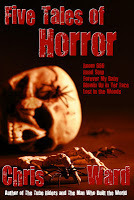
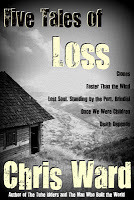
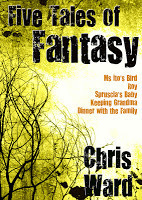
The main reason for these is that they increase my visibility. I want something I can have on promotion or being advertised every single day. The aim is that if people like the stories they'll go and buy my novels; they aren't really about making me money on their own, although Five Tales of Horror has actually sold surprisingly well. Plus, I came late to the game in self-publishing, so I have a lot of backlog. I meet authors pretty regularly now who have either started writing because it's so easy to self-publish or have just one or two novels in the tank. I'm 34. I started writing seriously with the intent to get published at 18, so I have 16 years of material to work with. Of course, I had huge periods of inactivity, but I also had periods of massive productivity. The result of that was some 80 short stories and the same again in various states of completion. Many of them have been published in magazines and have no reprint value so there's no point in leaving them on the hard drive if I can utilize them.
These are good stories, I'm not dredging the barrel by any means. Trust me, I have a lot of stories that are painful to read, but I won't be subjecting the general public to anything I think is junk. However, I don't have a bottomless well so after a couple more collections I'll need to start filling the coffers again with new material, or rework some old ideas.
These three put my total number of published works on Amazon to 25. My year-end target is 40, so I'm well on the way. I have at least two more anthologies to release, another comedy novella which is almost finished and at least two more novels. That will take me to 30, hopefully by mid summer. Then I'll be trying to get out at least one more novel by the end of the year, either an old one or one I'm working on, depending on how things go.
I have a bunch of half-finished stuff that I haven't worked on in a while, such as a romance novel and also a Tube Riders novella/novel featuring different characters. There's also the horror novel I've started writing, titled Dark Days, which is up to about 15,000 words. That too has suffered because of all the editing I've had to do in March. Novels, of course, are my main aim, because they sell better, and get remembered longer. However, I have to work with what I have and I'm in this for the long haul, so clearly up the backlog makes it easier to focus on new material going forward.
Hopefully some or all of this material will eventually see the light of day, but we'll see.
Anyway, back to work ...
Chris Ward
March 30th 2013
Not bad.
A few milestones first. Writing-wise, just yesterday I passed 75,000/250 pages for the year, which isn't bad, but should be a lot more. January and February were heavy new words months, but March was taken up mostly with editing, which kind of sucked. I like the end result of editing, but the actual process bores the hell out of me.
Sales-wise, not bad either. I've hit my 100 sales/month target every month this year and earlier this week I made a sale which put me one ahead of my yearly total for 2012. To beat my 2012 tally in three months made me pretty happy, but I'm still not selling anything like what I want to be selling to actually make any money. About 90% of my revenue goes back into advertising and production costs, which rise as my attempts to become increasingly professional also rise, and what little money I make really doesn't equate to a decent wage for the hours I put in. Really, unless you're in the same boat, you have no idea how much time I spend doing this. Don't get me wrong, I love it and I'm having a ball, but we're talking several hours a day, or almost all of my free time.
In terms of new publications, in March so far I've released three mini anthologies in the Five Tales Series.



The main reason for these is that they increase my visibility. I want something I can have on promotion or being advertised every single day. The aim is that if people like the stories they'll go and buy my novels; they aren't really about making me money on their own, although Five Tales of Horror has actually sold surprisingly well. Plus, I came late to the game in self-publishing, so I have a lot of backlog. I meet authors pretty regularly now who have either started writing because it's so easy to self-publish or have just one or two novels in the tank. I'm 34. I started writing seriously with the intent to get published at 18, so I have 16 years of material to work with. Of course, I had huge periods of inactivity, but I also had periods of massive productivity. The result of that was some 80 short stories and the same again in various states of completion. Many of them have been published in magazines and have no reprint value so there's no point in leaving them on the hard drive if I can utilize them.
These are good stories, I'm not dredging the barrel by any means. Trust me, I have a lot of stories that are painful to read, but I won't be subjecting the general public to anything I think is junk. However, I don't have a bottomless well so after a couple more collections I'll need to start filling the coffers again with new material, or rework some old ideas.
These three put my total number of published works on Amazon to 25. My year-end target is 40, so I'm well on the way. I have at least two more anthologies to release, another comedy novella which is almost finished and at least two more novels. That will take me to 30, hopefully by mid summer. Then I'll be trying to get out at least one more novel by the end of the year, either an old one or one I'm working on, depending on how things go.
I have a bunch of half-finished stuff that I haven't worked on in a while, such as a romance novel and also a Tube Riders novella/novel featuring different characters. There's also the horror novel I've started writing, titled Dark Days, which is up to about 15,000 words. That too has suffered because of all the editing I've had to do in March. Novels, of course, are my main aim, because they sell better, and get remembered longer. However, I have to work with what I have and I'm in this for the long haul, so clearly up the backlog makes it easier to focus on new material going forward.
Hopefully some or all of this material will eventually see the light of day, but we'll see.
Anyway, back to work ...
Chris Ward
March 30th 2013
Published on March 29, 2013 19:18
Five Tales of Fantasy
While waiting on my next two novels, Head of Words (at the proofreader) and Tube Riders: Exile (editing) I've been going gung ho on releasing a short story anthology series (un)imaginatively titled, Five Tales of ...
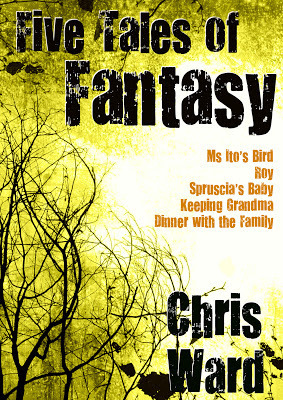
Volume #3 was just published this morning and is called Five Tales of Fantasy. For the cover I cheated a little bit - I bought a stock image but I didn't like it because it seemed too sci-fi and more appropriate for Volume #4, Five Tales of Dystopia. So what I did was cheat a little - I took the old stock photo I used for the first version of Cold Pools, resized it and played around with some colours to make it look a bit more interesting. This is the original and the cover -

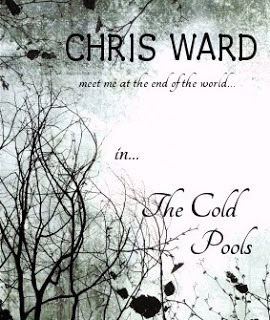
I liked the cover at first but came to think it looked a bit tacky. The new cover is way better (you can see it in the sidebar) but since I owned the stock photo I figured I'd try to use it.
The stories inside include Ms Ito's Bird, which is of course available in another collection and was my first published story, alongside four others. The middle story, Spruscia's Baby, was also published, but so long ago I can't remember where! Roy is perhaps my favorite in the collection, the story of a giant bug bought as a pet. I have no idea why that story didn't get a decent magazine sale, but I refused to call it something generic like A Bug's Life. I like Roy. Keeping Grandma is about what happens when old wizards begin to go senile, while Dinner with the Family is about zombies. I hate zombies - I think they're boring and cliched, so I decided to do my own take on them. It amused me, that's for sure.
This collection, like all the others in the series, will be priced at $1.49. As often happens when I read over my stories, I had a damn, I'm good, why aren't I famous? ego moment last night when I did a final typo check. They're good stories, enjoy.
Chris Ward
30th March 2013
Published on March 29, 2013 18:43
March 25, 2013
Five Tales of Loss - Free today
My newest short story collection is free today.
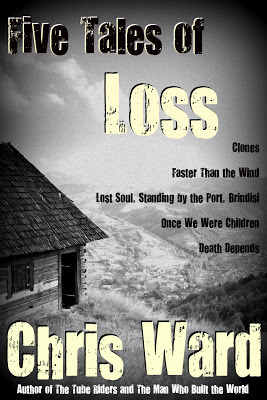 That is all.
That is all.
As always, shares, reads and reviews always much appreciated.
Enjoy!
Chris Ward
March 26th 2013
 That is all.
That is all.As always, shares, reads and reviews always much appreciated.
Enjoy!
Chris Ward
March 26th 2013
Published on March 25, 2013 17:50
March 24, 2013
The Road by Cormac McCarthy - My Review
If ever there was a book written for analysis in schools and universities then this is it. The Road is a bleak, desolate portrayal of one man's struggle in a post-apocalyptic world to protect his son.
In terms of plot, not a great deal actually happens. The man and the boy (they have no names) make their way slowly towards the coast for no apparent reason. Along the way they trust their luck to find food while avoiding bands of cannibals and other thieves looking to either rob them or eat them. We don't really know what happened, as it is never explained, but they live in a world where ash covers everything and nothing grows. The landscape is almost totally grey, and it is almost always either raining or snowing. The man is getting gradually sicker and sicker from some kind of lung problem, while the boy needs repeated convincing that they are the "good guys" who "carry the fire".
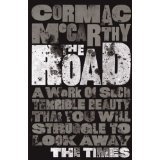
They meet several people along the way, from terrifying cannibals to desperate thieves and people who have given up just waiting for death to take them. The whole time the man forces them onwards, moving on even when they find places they could potentially hole up for a while, because nowhere is safe accept possibly the coast. He is resolute and resourceful but more than anything he burns with love for his son. He will not give up like the rest of humanity seems to have. He will do whatever it takes to keep his son alive.
This is a novel that will divide opinion. It is not beach reading nor action packed nor a thriller. It is bleak, miserable, at times frustrating and confusing. There's no romance. There's no happy ending (depending on how you analyse it). It's simply a powerful novel about love and struggle that also serves as a warning to mankind. So many dystopian-type books are utterly unrealistic, but The Road, in the same way as 1984, shows a future that is actually possible. There are powerful people around the world right now whose fingers hover over a button which could condemn us to the kind of struggle seen in The Road. It's a sobering thought.
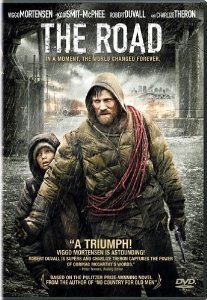
A lot of the criticism of this book that I've seen concerns the writing style. I sometimes think that a lot of readers really can't handle anything more complicated that what they can find on the rack in the giftshop next to an airport boarding gate. There are no speech marks and rarely apostrophes for contractions. And the problem is ...? Who really cares whether he writes "didn't" or "didnt"? And it is never, at any point, difficult to tell when someone is speaking nor who is speaking. The effect is hypnotic. It gives the whole novel a dreamy - make that nightmarish - quality. People that can't read a book that has no speech marks should try reading something that is actually difficult to read, like this. Danielewski's House of Leaves makes The Road look like Spot Goes to Town. The kind of reader who doesn't understand everything that this book represents is exactly the type of person who should read it.
Same goes with the grammar. I've read a lot of reviews that complain about it being hard to read. McCarthy does stuff like put adjectives in the wrong place or link five or six clauses with "and". This is a guy who won a Pulitzer Prize for literature. Every single word in this book is in it's place because he chose to put it there. As someone who writes vastly inferior books to this it is something to be treasured, because every line is something to learn from. And really, it's not very hard to read at all, nor is it frustrating. I found it fascinating.
A lot of people are going to hate this book. I had my own frustrations with it - mainly not knowing what caused the world to turn into a burned wasteland, while the ending will divide opinion - but it is not always about what is said but what is not said, or what is implied. The Road isn't a book that is going to make you happy, it's a book that will likely haunt you. However, a little dark makes the light so much brighter, and we could all do with a little haunting sometimes.
A bleak, chilling masterpiece. And the film is damn good too.
Chris Ward25th March 2012
In terms of plot, not a great deal actually happens. The man and the boy (they have no names) make their way slowly towards the coast for no apparent reason. Along the way they trust their luck to find food while avoiding bands of cannibals and other thieves looking to either rob them or eat them. We don't really know what happened, as it is never explained, but they live in a world where ash covers everything and nothing grows. The landscape is almost totally grey, and it is almost always either raining or snowing. The man is getting gradually sicker and sicker from some kind of lung problem, while the boy needs repeated convincing that they are the "good guys" who "carry the fire".

They meet several people along the way, from terrifying cannibals to desperate thieves and people who have given up just waiting for death to take them. The whole time the man forces them onwards, moving on even when they find places they could potentially hole up for a while, because nowhere is safe accept possibly the coast. He is resolute and resourceful but more than anything he burns with love for his son. He will not give up like the rest of humanity seems to have. He will do whatever it takes to keep his son alive.
This is a novel that will divide opinion. It is not beach reading nor action packed nor a thriller. It is bleak, miserable, at times frustrating and confusing. There's no romance. There's no happy ending (depending on how you analyse it). It's simply a powerful novel about love and struggle that also serves as a warning to mankind. So many dystopian-type books are utterly unrealistic, but The Road, in the same way as 1984, shows a future that is actually possible. There are powerful people around the world right now whose fingers hover over a button which could condemn us to the kind of struggle seen in The Road. It's a sobering thought.

A lot of the criticism of this book that I've seen concerns the writing style. I sometimes think that a lot of readers really can't handle anything more complicated that what they can find on the rack in the giftshop next to an airport boarding gate. There are no speech marks and rarely apostrophes for contractions. And the problem is ...? Who really cares whether he writes "didn't" or "didnt"? And it is never, at any point, difficult to tell when someone is speaking nor who is speaking. The effect is hypnotic. It gives the whole novel a dreamy - make that nightmarish - quality. People that can't read a book that has no speech marks should try reading something that is actually difficult to read, like this. Danielewski's House of Leaves makes The Road look like Spot Goes to Town. The kind of reader who doesn't understand everything that this book represents is exactly the type of person who should read it.
Same goes with the grammar. I've read a lot of reviews that complain about it being hard to read. McCarthy does stuff like put adjectives in the wrong place or link five or six clauses with "and". This is a guy who won a Pulitzer Prize for literature. Every single word in this book is in it's place because he chose to put it there. As someone who writes vastly inferior books to this it is something to be treasured, because every line is something to learn from. And really, it's not very hard to read at all, nor is it frustrating. I found it fascinating.
A lot of people are going to hate this book. I had my own frustrations with it - mainly not knowing what caused the world to turn into a burned wasteland, while the ending will divide opinion - but it is not always about what is said but what is not said, or what is implied. The Road isn't a book that is going to make you happy, it's a book that will likely haunt you. However, a little dark makes the light so much brighter, and we could all do with a little haunting sometimes.
A bleak, chilling masterpiece. And the film is damn good too.
Chris Ward25th March 2012
Published on March 24, 2013 20:12
March 22, 2013
Goals, goals, goals ... OR ... How to motivate yourself
I generally write this blog for readers of my books (and anyone else who wants to follow the madness) but I've recently had a few indie authors get in touch with me and one thing I've found that many people have in common when they start out is issues with movitivation.
Just as a disclaimer - I'm a lazy bastard. Doing something hardcore like getting up at 5 a.m. in mid-winter to write for two hours before work just isn't going to happen. In general I'd much rather surf Facebook or mess around on YouTube than be productive. I'd been scrapping around for years writing a book here and a book there without ever really getting anywhere.
On the 24th of January 2012, I entered the world of self-publishing for the first time with a short story called Forever My Baby. I was five days shy of my 33rd birthday, and after fifteen years of collecting rejection slips from agents and publishers I decided to give it a crack on my own.
I had seven novels and roughly eighty short stories already written, in various states of repair. I knew that I couldn't just rely on the backlist, though, I would need new material.
When I first pressed that self-publish button I was hellbent on eventually making writing my career. I knew I had the talent - I'd sold thirty odd short stories to magazines, two of them professionally, and Tube Riders came within a whisker of getting an agent - but whether I would have the dedication and the business sense to get anywhere on my own was another thing entirely.
Prior to self-publishing, my writing motivation was at an all time low. In 2011, for example, I wrote perhaps 20,000 words. That's nothing.
When I first started self-publishing, I concentrated on getting out the backlist, a few short stories, a collection, and then Tube Riders in March. The rest of the time I spent doing things like playing around on Twitter and emailing bloggers. In June I decided I needed new material.
Since June 20th last year I've written 325,000 words. It would probably be a lot more but for the last month I've done nothing but editing.
That's the equivalent of three full novels, or roughly a novel every three months. There are guys I know writing a novel a month but those are God-like levels. Three to four novels a year is a pretty solid output for an average mortal like me.
How?
It's an easy answer - goals.
I have dozens of little goals, and each one of them is important, but I don't want to talk about me, I want to talk about what you - the starting out writer - can do to motivate yourself.
The first and foremost rule of setting goals is to keep them attainable. Set yourself stupidly difficult goals and you'll spend all your time frustrated.
As example of a bad goal - last November I was feeling all confident so I took on NaNoWriMo. I took it a step further - I tried to write a 50,000 novel from scratch while carrying on with all my other stuff.
It was a bridge too far.
I started out okay, but a week in my computer broke. I lost 10,000 words, most of them on my NaNo. I started out again, but it just wasn't to be - I had another computer crash and lost another 5000. You guessed it - that was my NaNo. I tried a third time but my motivation was done and I quit. And all the while I was wasting time trying to force myself to rewrite a novel that I was force-writing in the first place, I lost ground on all my other stuff.
Big mistake.
Keep your goals simple.
Wordcounts
Wordcounts are the easy one. If you struggle to write 1000 words a day but can quite easily get 600 - 700, set your goal at 500. That way, you'll easily attain it and you'll feel good about yourself. If you set your goal at 1500 and you only make 1200, even though you've actually achieved more, you'll feel like you haven't.
Make a big spreadsheet, and every time you start a new work in progress, put it in and keep a daily tally of the wordcount. Don't limit it to daily, either - have monthly and yearly targets plus targets for each work. If you're like me and usually have five or six different WIPs on the go all at the same time, you'll find that you'll always be within 100 - 200 words of one target or another. Keep pushing to get that extra 100 - 200 words down and then you'll see another little target to aim for. I can easily get 2000 words down by aiming for these little targets.
One other little thing that I cannot say often enough - if you can't touch type, LEARN. It's the one single most useful skill I have. People tell me my writing has really good rhythm - that's because I can type it almost as quickly as I think it. If you're plodding away with two fingers doing ten words a minute - get a program off the internet or take a course. You won't regret it. It takes time to learn - after doing a course in my final year of school - I spent six months with a tea towel draped over my hands while forcing myself to use the correct fingers for each key. It was brutally frustrating, but so, so worth it. So, one more time LEARN TO TOUCH TYPE. Don't um and ah, and mutter about how difficult it is when you start out ... JUST DO IT. Trust me on this ...
Publications
Once you've started publishing, set publication goals. Remember to keep them realistic. For example, in 2012 I published 21 items - two novels, one short story collection, two novellas, one novel split into three and a bunch of short stories. My aim for the end of 2013 is to hit 40. I just published item number 25 and I have nos 26, 27, 28 and 29 in the can and ready to go. It'll be a push but with a handful of short stories I should make it. My target for 2014 will probably be 50 - by the end of next year I'll have a lot less backlog and will be relying mostly on new material. Remember - as a self-published author you're not just relying on only new material - you can bump up your publication count by creating packages or bundles. For example, if you have ten short stories, there's no reason why you can't have two collections of five, an omnibus of ten, and then each story individually, all at different prices. Remember, this is business. I don't agree with ripping people off but what you're doing is offering purchasing options while increasing your visibility. Buyers choose whether they want to buy something. As long as your description accurately matches what they're buying, you're not doing anything wrong.
My goals are pretty high but I consider them attainable. Remember to set your own - for example a short story every two months, or a novel every six months, or one novel and two short stories a year. Keep your targets within what you are confident you can achieve.
Marketing Goals
You can pick and choose what these are, depending on your preferred forms of marketing. If you use Facebook a lot, then you can aim at building up your number of likes. I'm currently aiming for 500, mostly by using Facebook ads to target possible readers and then engaging the people that join up as much as possible to make them stay ... for a comprehensive breakdown on how to use Facebook for marketing, study and memorise every word of this excellent post by a good writing buddy of mine, John Daulton. That is the blueprint to using Facebook as an author.
Twitter, also is another one that authors often use. I'm not a big fan, but setting follower goals or tweet goals can be useful. Personally I've had little success through Twitter, mainly because I hate it, but some people swear by it.
Goodreads is my favorite place on the net for marketing. There are tons of things you can do there - set up groups, run events, giveaways, all sorts. One stat I keep an eye on and try to improve is how many users have my books on their to-read shelves. You can get on loads of these by doing paperback giveaways. My target for 2013 is 2000 unique users. Currently it's 1082, but I should make it if I do perhaps one giveaway - of a single book at a time - every two months. This is one of those things that you won't see an immediate sales bump for, but it's part of visibility and its that whole "speculate to accumulate" thing. I currently put about 80% of what I earn into marketing and book stuff - covers, formatting, editing, proofreading.
When you start out, it's best to concentrate most on writing rather than marketing. This post by the very successful thriller writer Robert J. Crane basically sums up why. In short, if you write a book that someone likes, you want them to have a bunch of others to choose from. It's possible to blow up and be a bestseller with one book, but it's rare. You're far more likely to have steady success across ten books.
Sales Targets
My personal favorite - this is where you get the cash. In theory ... Again, be realistic. If you have just one short story out you might be lucky to make a sale a month. I've been there. I have shorts out now that haven't sold a single copy in six months.
As always, keep them reasonable. Of course, when I published Tube Riders last March, I was hoping to have sold 10,000 copies by the end of the year. It didn't happen - but that doesn't mean it won't sell 10,000 this year, or next year. However, putting your money on a sudden boom like this is unrealistic. They happen, but not often. It's far better to look at your overall trends and aim for a gradual improvement as you put your books out. By August or September last year my target was a sale a day - and it was a struggle, but they gradually came (mostly from hammering Amazon free promos). This year my aim is 100 sales/month. I've managed it four months in a row, mostly through endless free and bargain book promos, some of which are costing me money. Again, speculate to accumulate. If you're a real writer you're in this for the long haul - building up repeat customers over time is of paramount importance.
Long Term Goals
So, what do you want from all this? Do you want to be a pro, or do you just want to make a bit of cash for a year or two? It's all up to you, of course, but again here's another opportunity to set targets.
Mine, of course, are huge. I started this just shy of my 33rd birthday and my goal is to be doing this for a living by the time I'm 40. Seven years. In the interim, my three year goal is to be making $500 a month. I'm currently making about $200, although most of that is going back into the business. I'm not getting rich yet. Still, got to start somewhere ...
As always, look at what you think you can achieve, and keep your goals realistic. I know writers who've been able to quit their day jobs within six months, but out of half a million or so self-published writers that really is like being struck by lightning. It might happen, but it probably won't, so plan according to what you think is attainable.
Well, my hands are getting tired from typing all this, and I apologise for not being one of those bloggers who breaks up blocks of endless text with cute pictures - I could put some book covers in but I think you've seen all those already ... I hope some of you out there find this useful. Feel free to add any comments or link to this blog anywhere you like and if I think of any more information to add I'll update the blog as I get to it. Most of it is pretty basic stuff but you're building your career from the ground up after all ...
Chris Ward
March 23rd 2013
Just as a disclaimer - I'm a lazy bastard. Doing something hardcore like getting up at 5 a.m. in mid-winter to write for two hours before work just isn't going to happen. In general I'd much rather surf Facebook or mess around on YouTube than be productive. I'd been scrapping around for years writing a book here and a book there without ever really getting anywhere.
On the 24th of January 2012, I entered the world of self-publishing for the first time with a short story called Forever My Baby. I was five days shy of my 33rd birthday, and after fifteen years of collecting rejection slips from agents and publishers I decided to give it a crack on my own.
I had seven novels and roughly eighty short stories already written, in various states of repair. I knew that I couldn't just rely on the backlist, though, I would need new material.
When I first pressed that self-publish button I was hellbent on eventually making writing my career. I knew I had the talent - I'd sold thirty odd short stories to magazines, two of them professionally, and Tube Riders came within a whisker of getting an agent - but whether I would have the dedication and the business sense to get anywhere on my own was another thing entirely.
Prior to self-publishing, my writing motivation was at an all time low. In 2011, for example, I wrote perhaps 20,000 words. That's nothing.
When I first started self-publishing, I concentrated on getting out the backlist, a few short stories, a collection, and then Tube Riders in March. The rest of the time I spent doing things like playing around on Twitter and emailing bloggers. In June I decided I needed new material.
Since June 20th last year I've written 325,000 words. It would probably be a lot more but for the last month I've done nothing but editing.
That's the equivalent of three full novels, or roughly a novel every three months. There are guys I know writing a novel a month but those are God-like levels. Three to four novels a year is a pretty solid output for an average mortal like me.
How?
It's an easy answer - goals.
I have dozens of little goals, and each one of them is important, but I don't want to talk about me, I want to talk about what you - the starting out writer - can do to motivate yourself.
The first and foremost rule of setting goals is to keep them attainable. Set yourself stupidly difficult goals and you'll spend all your time frustrated.
As example of a bad goal - last November I was feeling all confident so I took on NaNoWriMo. I took it a step further - I tried to write a 50,000 novel from scratch while carrying on with all my other stuff.
It was a bridge too far.
I started out okay, but a week in my computer broke. I lost 10,000 words, most of them on my NaNo. I started out again, but it just wasn't to be - I had another computer crash and lost another 5000. You guessed it - that was my NaNo. I tried a third time but my motivation was done and I quit. And all the while I was wasting time trying to force myself to rewrite a novel that I was force-writing in the first place, I lost ground on all my other stuff.
Big mistake.
Keep your goals simple.
Wordcounts
Wordcounts are the easy one. If you struggle to write 1000 words a day but can quite easily get 600 - 700, set your goal at 500. That way, you'll easily attain it and you'll feel good about yourself. If you set your goal at 1500 and you only make 1200, even though you've actually achieved more, you'll feel like you haven't.
Make a big spreadsheet, and every time you start a new work in progress, put it in and keep a daily tally of the wordcount. Don't limit it to daily, either - have monthly and yearly targets plus targets for each work. If you're like me and usually have five or six different WIPs on the go all at the same time, you'll find that you'll always be within 100 - 200 words of one target or another. Keep pushing to get that extra 100 - 200 words down and then you'll see another little target to aim for. I can easily get 2000 words down by aiming for these little targets.
One other little thing that I cannot say often enough - if you can't touch type, LEARN. It's the one single most useful skill I have. People tell me my writing has really good rhythm - that's because I can type it almost as quickly as I think it. If you're plodding away with two fingers doing ten words a minute - get a program off the internet or take a course. You won't regret it. It takes time to learn - after doing a course in my final year of school - I spent six months with a tea towel draped over my hands while forcing myself to use the correct fingers for each key. It was brutally frustrating, but so, so worth it. So, one more time LEARN TO TOUCH TYPE. Don't um and ah, and mutter about how difficult it is when you start out ... JUST DO IT. Trust me on this ...
Publications
Once you've started publishing, set publication goals. Remember to keep them realistic. For example, in 2012 I published 21 items - two novels, one short story collection, two novellas, one novel split into three and a bunch of short stories. My aim for the end of 2013 is to hit 40. I just published item number 25 and I have nos 26, 27, 28 and 29 in the can and ready to go. It'll be a push but with a handful of short stories I should make it. My target for 2014 will probably be 50 - by the end of next year I'll have a lot less backlog and will be relying mostly on new material. Remember - as a self-published author you're not just relying on only new material - you can bump up your publication count by creating packages or bundles. For example, if you have ten short stories, there's no reason why you can't have two collections of five, an omnibus of ten, and then each story individually, all at different prices. Remember, this is business. I don't agree with ripping people off but what you're doing is offering purchasing options while increasing your visibility. Buyers choose whether they want to buy something. As long as your description accurately matches what they're buying, you're not doing anything wrong.
My goals are pretty high but I consider them attainable. Remember to set your own - for example a short story every two months, or a novel every six months, or one novel and two short stories a year. Keep your targets within what you are confident you can achieve.
Marketing Goals
You can pick and choose what these are, depending on your preferred forms of marketing. If you use Facebook a lot, then you can aim at building up your number of likes. I'm currently aiming for 500, mostly by using Facebook ads to target possible readers and then engaging the people that join up as much as possible to make them stay ... for a comprehensive breakdown on how to use Facebook for marketing, study and memorise every word of this excellent post by a good writing buddy of mine, John Daulton. That is the blueprint to using Facebook as an author.
Twitter, also is another one that authors often use. I'm not a big fan, but setting follower goals or tweet goals can be useful. Personally I've had little success through Twitter, mainly because I hate it, but some people swear by it.
Goodreads is my favorite place on the net for marketing. There are tons of things you can do there - set up groups, run events, giveaways, all sorts. One stat I keep an eye on and try to improve is how many users have my books on their to-read shelves. You can get on loads of these by doing paperback giveaways. My target for 2013 is 2000 unique users. Currently it's 1082, but I should make it if I do perhaps one giveaway - of a single book at a time - every two months. This is one of those things that you won't see an immediate sales bump for, but it's part of visibility and its that whole "speculate to accumulate" thing. I currently put about 80% of what I earn into marketing and book stuff - covers, formatting, editing, proofreading.
When you start out, it's best to concentrate most on writing rather than marketing. This post by the very successful thriller writer Robert J. Crane basically sums up why. In short, if you write a book that someone likes, you want them to have a bunch of others to choose from. It's possible to blow up and be a bestseller with one book, but it's rare. You're far more likely to have steady success across ten books.
Sales Targets
My personal favorite - this is where you get the cash. In theory ... Again, be realistic. If you have just one short story out you might be lucky to make a sale a month. I've been there. I have shorts out now that haven't sold a single copy in six months.
As always, keep them reasonable. Of course, when I published Tube Riders last March, I was hoping to have sold 10,000 copies by the end of the year. It didn't happen - but that doesn't mean it won't sell 10,000 this year, or next year. However, putting your money on a sudden boom like this is unrealistic. They happen, but not often. It's far better to look at your overall trends and aim for a gradual improvement as you put your books out. By August or September last year my target was a sale a day - and it was a struggle, but they gradually came (mostly from hammering Amazon free promos). This year my aim is 100 sales/month. I've managed it four months in a row, mostly through endless free and bargain book promos, some of which are costing me money. Again, speculate to accumulate. If you're a real writer you're in this for the long haul - building up repeat customers over time is of paramount importance.
Long Term Goals
So, what do you want from all this? Do you want to be a pro, or do you just want to make a bit of cash for a year or two? It's all up to you, of course, but again here's another opportunity to set targets.
Mine, of course, are huge. I started this just shy of my 33rd birthday and my goal is to be doing this for a living by the time I'm 40. Seven years. In the interim, my three year goal is to be making $500 a month. I'm currently making about $200, although most of that is going back into the business. I'm not getting rich yet. Still, got to start somewhere ...
As always, look at what you think you can achieve, and keep your goals realistic. I know writers who've been able to quit their day jobs within six months, but out of half a million or so self-published writers that really is like being struck by lightning. It might happen, but it probably won't, so plan according to what you think is attainable.
Well, my hands are getting tired from typing all this, and I apologise for not being one of those bloggers who breaks up blocks of endless text with cute pictures - I could put some book covers in but I think you've seen all those already ... I hope some of you out there find this useful. Feel free to add any comments or link to this blog anywhere you like and if I think of any more information to add I'll update the blog as I get to it. Most of it is pretty basic stuff but you're building your career from the ground up after all ...
Chris Ward
March 23rd 2013
Published on March 22, 2013 20:58



